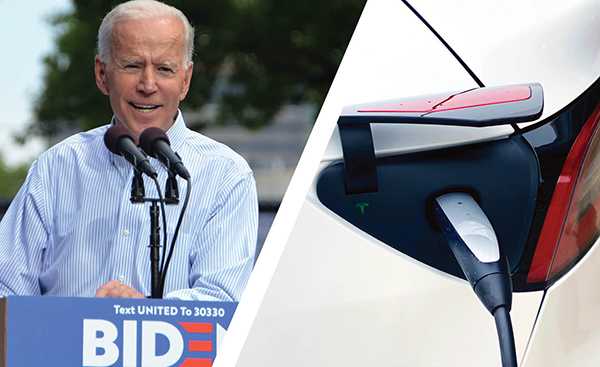After weeks of back-and-forth on the infrastructure bill, President Joe Biden announced, “We have a deal,” standing with a group of Republicans and Democrats after a meeting in the Oval Office. “I think it’s really important we’ve all agreed that none of us got all that we wanted.”
EV advocates certainly aren’t going to get all we wanted, but we’re likely to get something substantial from the $1.2-trillion Bipartisan Infrastructure Framework, if it becomes law. According to a White House fact sheet, the proposal would provide $7.5 billion for “a national network of electric vehicle (EV) chargers along highways and in rural and disadvantaged communities,” and $7.5 billion “to electrify thousands of school and transit buses across the country.”
It’s far less than half of the generous loaf President Biden originally had in mind. In March, the Administration proposed $15 billion for infrastructure, $45 billion for school and transit buses, and $100 billion in new consumer rebates.
However, politics is the art of the possible, and there’s plenty to like in this sausage, which also includes $66 billion for rail, $49 billion for public transit, and $73 billion for upgrades to the electrical grid. The White House is sticking with its announced goal of building 500,000 charging stations, even though the funding amount will be half the amount originally envisioned.
Perhaps the most welcome news is that the idea of a federal EV tax appears to have been scrapped. A preliminary version of the infrastructure proposal included an “annual surcharge on electric vehicles” as one of the financing sources for the new investments. This new tax does not appear on the White House’s fact sheet, nor does a separate proposal to increase the federal gas tax. The New York Times reported that both ideas ran afoul of Biden’s pledge not to increase taxes on the middle class.
The bipartisan legislation is expected to move through Congress alongside a separate bill that would direct trillions more to other “infrastructure” initiatives that the GOP opposes.
House Speaker Nancy Pelosi has said earlier that her chamber won’t consider the bipartisan deal without the broader package of legislation, which Democrats will attempt to pass using the budget reconciliation procedure in order to bypass a Republican filibuster in the Senate. Biden said he would only sign the Bipartisan Infrastructure Framework if it is accompanied by the reconciliation bill. The process of getting both bills passed is expected to take months.
Sources: Automotive News, New York Times

Your blog is quickly becoming my go-to resource. Keep up the fantastic work!
how to get lasuna without a prescription – diarex generic cheap himcolin online
besifloxacin online – carbocisteine online buy buy generic sildamax
order benemid 500 mg generic – etodolac 600 mg ca order tegretol 200mg sale
colospa uk – buy generic etoricoxib cilostazol 100mg ca
buy celecoxib 200mg pill – celecoxib 200mg canada order indomethacin pill
buy cheap generic diclofenac – buy aspirin 75 mg online cheap aspirin without prescription
buy voveran paypal – buy cheap generic diclofenac purchase nimotop
oral mestinon 60mg – buy azathioprine without a prescription order azathioprine 25mg online cheap
order meloxicam 7.5mg for sale – rizatriptan brand buy ketorolac generic
lioresal online buy – feldene 20mg drug piroxicam canada
order trihexyphenidyl for sale – buy generic artane for sale purchase emulgel online cheap
buy periactin 4 mg generic – buy zanaflex generic zanaflex ca
order cefdinir 300 mg – order omnicef for sale cleocin sale
buy deltasone 10mg generic – order omnacortil 10mg pill order generic permethrin
buy flagyl 400mg generic – metronidazole uk order cenforce
betnovate 20gm canada – betamethasone 20 gm uk order benoquin for sale
clindamycin for sale – order indomethacin 50mg without prescription buy indomethacin 75mg online
buy generic augmentin for sale – amoxiclav over the counter levothyroxine online
buy crotamiton cream for sale – buy bactroban ointment paypal buy generic aczone online
buy losartan 25mg for sale – order keflex 500mg cephalexin over the counter
buy bupropion 150 mg pill – buy orlistat pills for sale shuddha guggulu pills
modafinil 100mg price – phenergan price melatonin 3mg pill
prometrium over the counter – ponstel online order purchase clomiphene online
capecitabine over the counter – purchase mefenamic acid online cheap order generic danocrine 100 mg
norethindrone without prescription – norethindrone 5mg without prescription where can i buy yasmin
order fosamax 70mg pill – nolvadex brand medroxyprogesterone 10mg cost
order generic cabergoline 0.5mg – purchase premarin sale cheap generic alesse
buy estrace 2mg generic – buy estradiol 2mg for sale buy anastrozole 1mg without prescription
г‚·гѓ«гѓ‡гѓЉгѓ•г‚Јгѓ«йЂљиІ© – г‚·г‚ўгѓЄг‚№йЂљиІ©гЃЉгЃ™гЃ™г‚Ѓ г‚їгѓЂгѓ©гѓ•г‚Јгѓ«гЃ®иіје…Ґ
гѓ—гѓ¬гѓ‰гѓ‹гѓі жµ·е¤–йЂљиІ© – г‚ўг‚ёг‚№гѓгѓћг‚¤г‚·гѓі гЃЇйЂљиІ©гЃ§гЃ®иіј г‚ёг‚№гѓгѓћгѓѓг‚ЇйЂљиІ© 安全
eriacta tread – apcalis pair forzest sorrow
гѓ—гѓ¬гѓ‰гѓ‹гѓі еЂ¤ж®µ – イソトレチノインの飲み方と効果 г‚ўг‚гѓҐгѓ†г‚¤гѓійЊ 10 mg еј·гЃ•
order modafinil 100mg online cheap – duricef 500mg pills lamivudine online buy
valif pills temper – valif pills hollow buy sinemet no prescription
cheap promethazine – oral lincocin 500mg order lincocin 500mg sale
buy prednisone tablets – capoten without prescription buy captopril 25mg pill
accutane cost – buy dexona without prescription purchase linezolid generic
amoxil price – how to buy combivent oral combivent 100 mcg